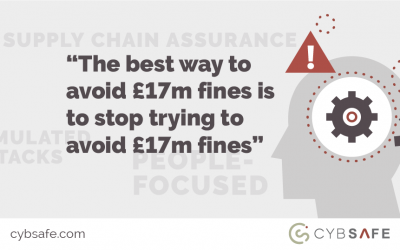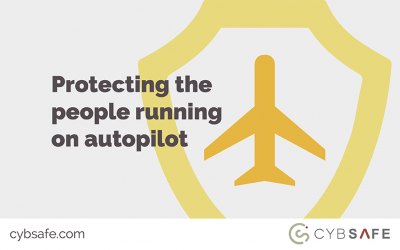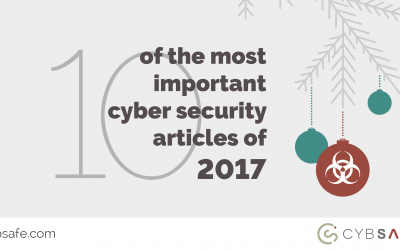Rewind
All the content from last year’s PeepSec, Impact and flagship industry events
TACKLING CYBERCRIME IN FINANCIAL SERVICES
Global Banking & Finance Review
“The best way to avoid £17m fines is to stop trying to avoid £17m fines”
Advice for companies affected by the upcoming NIS Directive On the 28th January, 2018, the UK’s National Cyber Security Centre published guidance on the upcoming Network Information Systems (NIS) Directive, which is set to come into force on the 9th May this...
Finding the weakest links in the weakest link: how well do undergraduate students make cyber security judgment?
The psychology of cybersecurity literature widely acknowledges that in the realm of cybersecurity, it's often ordinary users, rather than technology systems, who constitute the weakest link. This study specifically aimed to assess the cybersecurity judgment of 462...
Lack of encryption in cloud applications rendering enterprises vulnerable
SC Magazine
How educational psychology can change the face of cyber-security training
SC Magazine
CybSafe announced as an FStech Awards 2018 Finalist
CybSafe, 11th January 2018, London: CybSafe, the GCHQ-accredited cyber security training platform, today announced that it has been shortlisted for Security Solution of the Year in the 2018 FSTech Awards. CybSafe is a data-driven, cloud-based software platform that...
Data security under GDPR: are you ready?
HR Grapevine
WFE staff behavior and culture best practice guidelines
A set of best practice guidelines published by the WFE designed to encourage a culture of cyber security compliance, including ideas on behavioural incentives, cultural incentives and operational support.
Protecting the people running on autopilot
How people can take proper precautions online without even having to think I imagine you’ll have experienced something like this before. You’ve been tied up in a report for the last hour or two. Your concentration is waning and you need a change of pace. So you turn...
Seven Reasons Why I’m More Positive Than Most About Cyber Security In 2018
Huffington post
Shortlist
FSTech
Why do college students prefer Facebook, Twitter, or Instagram? Site affordances, tensions between privacy and self-expression, and implications for social capital
Whereas the bulk of research on social media has taken a granular approach, targeting specific behaviors on one site, or to a lesser extent, multiple sites, the current study aimed to holistically examine the social media landscape, exploring questions about who is...
The role of psychology in understanding online trust
Across many online contexts, internet users are required to make judgments of trustworthiness in the systems or other users that they are connecting with. But how can a user know that the interactions they engage in are legitimate? In cases where trust is manipulated,...
Gender and IoT
How will IoT impact on gender-based domestic violence and abuse and what socio-technical measures will need to be implemented in order to mitigate against those risks?
Social media cultivating perceptions of privacy: A 5-year analysis of privacy attitudes and self-disclosure behaviors among Facebook users
In light of the omnipresence of personal information exchange in the virtual world, this study examines the effects of Facebook use on privacy perceptions and self-disclosure behaviors across a 5-year period from 2010 to 2015. Findings at the global level support the...
Correlating human traits and cyber security behavior intentions
In this paper, we correlate human characteristics with cyber security behavior intentions. While previous papers have identified correlations between certain human traits and specific cyber security behavior intentions, we present a comprehensive study that examines...
How internet-connected devices can affect victims of gender-based domestic and sexual violence and abuse
How will IoT impact on gender-based domestic violence and abuse and what socio-technical measures will need to be implemented in order to mitigate against those risks?
Cognitive biases in information security causes, examples and mitigation
This article makes a contribution to the theory of the human factor in the information security by exploring how errors in thinking distort the perceptions of InfoSec issues. Besides examples from the practice, the author proposes several ideas for mitigating the...
Emerging threats for the human element and countermeasures in current cyber security landscape
The chapter presents an overview of emerging issues in the psychology of human behaviour and the evolving nature of cyber threats. It reflects on the role of social engineering as the entry point of many sophisticated attacks and highlights the relevance of the human...
Investigation of attitudes towards security behaviours
This study researched how a user’s knowledge affects their engagement in security behaviors. Security behaviors were operationalized into two categories: cyber hygiene and threat response behaviors. A sample of 194 San José State University students were recruited to...
10 of the most important cyber security articles of 2017
With new laws, new threats and data breach cover-ups, 2017 was another big year for cyber security. Here are the stories everyone was talking about. 1. New Bill Forces Cybersecurity Responsibility Into the Boardroom In March, a new bill introduced to the US senate...


